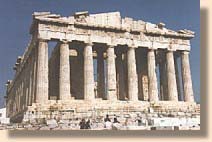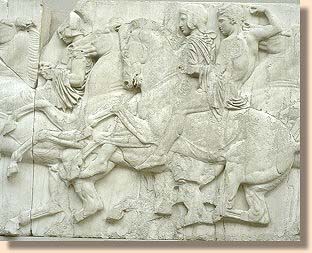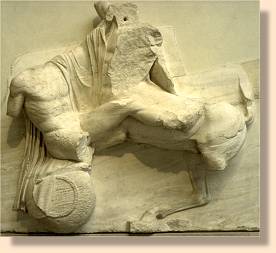
DEMANDS OF THE GREEK GOVERNMENT

DEMANDS OF THE GREEK GOVERNMENT
 During his visit to London as a guest of the British Government for the
inauguration of the new " Tate Modern' gallery, the Greek Minister of Culture
Mr Theodoros Pangalos redefined Greece's policy goals with regard to the return
of the Parthenon sculptures. Speaking in London to Greek journalists on 13 May
2000, he outlined a policy statement based on the following principles:
During his visit to London as a guest of the British Government for the
inauguration of the new " Tate Modern' gallery, the Greek Minister of Culture
Mr Theodoros Pangalos redefined Greece's policy goals with regard to the return
of the Parthenon sculptures. Speaking in London to Greek journalists on 13 May
2000, he outlined a policy statement based on the following principles:
"The issue is not confined to the agenda between two governments. It is a matter between two peoples and their respective parliaments. The British Parliament, having entrusted the Parthenon sculptures to the British Museum, is the only authority that can change the situation. The British Government with its parliamentary majority can naturally bring this about speedily but we do not consider this simply as an issue between our two governments.
There need not be any winners and losers in the solution of this long-standing problem. There is no legal claim against anyone in this case and no adjudication is required.
The return of the Parthenon sculptures is simply a matter of co-operation between the Greek and the British peoples in the wider European context to which they both belong.
Who owns the sculptures is unimportant, irrelevant and immaterial. What matters is where they are and where they should be. On this point I believe that we have a very strong case, which is the continuity and the integrity of the unique monument known as the Parthenon. This monument, let me point out, was not built by Pericles as a storehouse for free-standing sculptures. The Parthenon sculptures were conceived and created as an integral part of the temple. Having kept them apart from the rest of the monument for nearly two centuries is long enough and should no longer be tolerated. The time has come for the re-unification of the monument on its original Acropolis site. Therefore, what we ask is for the sculptures to be returned so that they can be housed in a new state-of-the art Acropolis Museum that will be ready by 2004. The integrity of the monument will thus be restored on its original site with the sculptures displayed against the background of the Parthenon and in visual contact with the temple. In the meantime, we will continue to explain our position and press for the return of the Parthenon sculptures in due course.
 Returning
the sculptures to Greece need not, should not and will not diminish Greece's
presence in the British Museum. Quite the contrary, in fact. For one thing,
full use can be made of modern technology that can produce copies of the originals
so perfect that these can be distinguished from the originals only through elaborate
chemical analysis. There is also the possibility of holding periodic exhibitions
of valuable, rare and stunning Greek antiquities in London on loan from Greek
Museums. The great British Museum might even see its worldwide prestige and
appeal enhanced if our proposal for a negotiated return of the Parthenon sculptures
implemented.
Returning
the sculptures to Greece need not, should not and will not diminish Greece's
presence in the British Museum. Quite the contrary, in fact. For one thing,
full use can be made of modern technology that can produce copies of the originals
so perfect that these can be distinguished from the originals only through elaborate
chemical analysis. There is also the possibility of holding periodic exhibitions
of valuable, rare and stunning Greek antiquities in London on loan from Greek
Museums. The great British Museum might even see its worldwide prestige and
appeal enhanced if our proposal for a negotiated return of the Parthenon sculptures
implemented.
Returning the Parthenon sculptures to Greece need not and should not create a precedent , leading to claims for the general restitution of cuItural property to the countries of origin and thus depleting the great museums of valuable exhibits. I wish to emphasize yet again that we request the return, of only those sculptures removed from the Parthenon by Lord Elgin and that we make no general claim for the restitution of any other artefacts. We simply want restore the unity of a unique monument which is the supreme symbol of the Greek cultural heritage and western civilization."
Abridged from Culture Watch, Press office, Greek Embassy, London.
A discussion on the Parthenon Marbles on Monday 5 June was organised by the 'Culture, Media and Sport Committee' in the context of its inquiry on 'Cultural Property: Return and Illicit Trade' at the House of Commons. Questions, some really hard-hitting, were asked by the members of the Committee and answers were given by Mr George Papandreou, Greek Foreign Minister and Mrs Lena Mendoni, General Secretary of the Ministry of Culture representing the Greek Government. Mr Jules Dassin, film director, head of the 'Melina Mercouri Foundation' contributed to the discussion by his crisp, short and witty remarks making full use of the greater freedom of expression that his non-official status afforded him.
Ownership of the Marbles irrelevant, location important
As the Greek side presented their case in flawless English independent
observers noted a change of emphasis in the Greek argument on two points: a)
There was a certain 'dilution' of the ownership issue leading to less
recrimination and more stress on the 'partnership' approach; b) the formal
undertaking that the new state-of-the-art Acropolis Museum will be ready to
house the Marbles before the 'Athens 2004' Olympics, the implication being that
until this happens the campaign for the return of the Marbles will focus on the
issue of principle rather than on any immediate implementation.
 Mr Papandreou
centred his argument on the need to reunify the Parthenon. He never once mentioned
any rights of inheritance that modern Greeks might claim from Pericles. He was
polite, firm and creative in his proposals. He floated in a tantalising way
a number of original ideas excluding nothing and promising much. He insisted
on the merits of a property structured dialogue that would provide solutions
to all problems and sort out all the details to everybody's satisfaction.
Mr Papandreou
centred his argument on the need to reunify the Parthenon. He never once mentioned
any rights of inheritance that modern Greeks might claim from Pericles. He was
polite, firm and creative in his proposals. He floated in a tantalising way
a number of original ideas excluding nothing and promising much. He insisted
on the merits of a property structured dialogue that would provide solutions
to all problems and sort out all the details to everybody's satisfaction.
Did the Greek Government - Mr Fearn wanted to know - base its claim for a return of the Marbles on the contention that Lord Elgin took them off the Parthenon wrongfully in the first place? Well, Mr Papandreou wasn't there to rake over events that happened two centuries ago. Better let the past take care of itself. Even what happened to the Marbles in the British Museum in the late 30s he considered a matter for scholars, not central to the case he was making today.
The chairman was more insistent. Since the Committee was looking at cases of illicit trade of works of art it was important to establish whether Lord Elgin had acquired these treasures illicitly or not. So could the Minister enlighten the Committee members on this issue? Yes indeed, this allegation has been part of the Greek argument until now but Greece does not intend to pursue it in the courts. Jules Dassin was more outspoken: Yes, Lord Elgin's title was dubious but this is all water under the bridge. The emphasis now is on reconciliation, in sweetness and light.
No legal claims, no court case, emphasis on partnership
So who would own the Marbles in future? members wondered and wanted to know. Mr
Papandreou sketched out a number of possibilities. There might be co-ownership
with the British Museum, the Marbles might come under the custodianship of a
new foundation under UNESCO, even the European Union's involvement might be the
subject of a dialogue between the interested parties. Quoting Culture Minister
Mr Pangalos (now replaced by Mr Evangelos Venizelos) the Foreign Minister
repeated that 'the issue of ownership is immaterial and irrelevant. The
question arising is where these Marbles are now and where they should be'.
Mr Fearn wanted to know whether he was right in thinking that there would never be a court case by Greece to get the Marbles back. Yes he was right in thinking that, came the unambiguous answer. Was Britain the only country holding bits of Parthenon? No, but she has 98% of all the Parthenon pieces held outside the country. Greece, the Foreign Minister said, is not claiming any other artefacts, she is simply trying to reassemble all the missing parts of a unique monument.
Reassemble them where exactly? Mr Wyatt wanted to know. Since they would not go back to the Parthenon itself, but just to another Museum how can one speak of 'reintegration'? Here the answer was more elaborate. Mr Papandreou pointed out that due to structural damage done to the Parthenon when the Marbles were removed and to the present fear of pollution, repositioning them is now well nigh impossible. On the other hand, placing them in the new Museum-to-be in visual contact with the Parthenon would allow scholars to study them in situ.
Britain to be a country privileged in exhibiting Greek art
What could Greece do to make it easier for the British Museum to let the
Marbles go? Well, a great deal actually. Britain could become the only country
in the world with a permanent rotating exhibition of ancient Greek art. There
would thus be no gap, no empty rooms in the British Museum. At this point Jules
Dassin added that there are extraordinary riches in the BM's storerooms that
could be displayed for the world to enjoy. Asked by the chairman whether he
meant that by taking back the Marbles, the Greeks would be thus doing a favour
to the British Museum, Jules Dassin replied : 'We come with warm feelings. We
love you'.
Mr Papandreou also mentioned the possibilities of making true copies of the Marbles for the British Museum as modern technology now allows. He said unequivocally that Greece would pay for them. Answering a remark by Mr Maxton that this could of course work the other way around as well, the Greek Minister pointed out that it would be logical for the originals to be with the originals and not the copies with the originals. Mr Maxton admitted that there was no answer to that. The hearing was concluded with Mr Papandreou emphasising that the Marbles have a past but also a future and that Greeks and Britons could shape that future together.
|
|